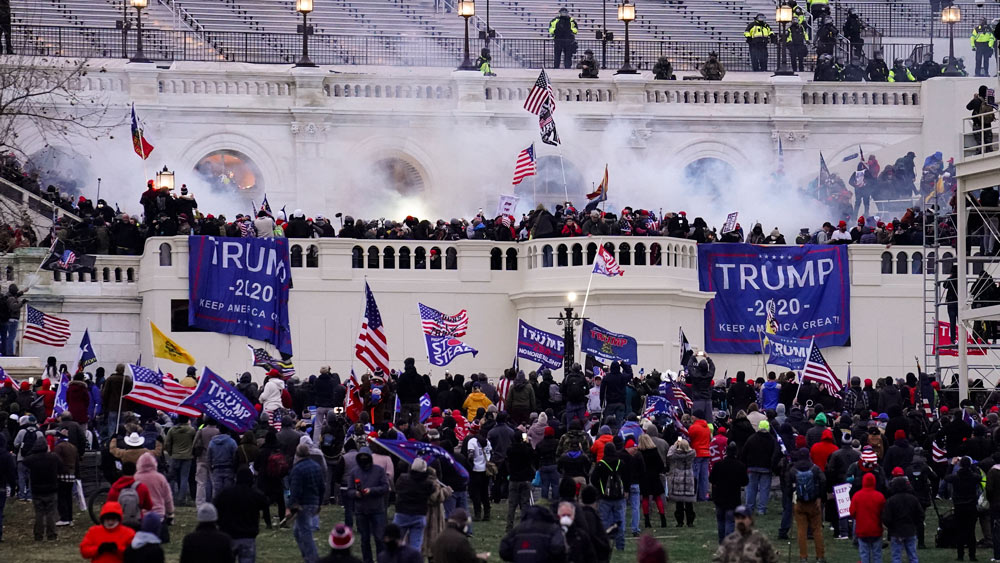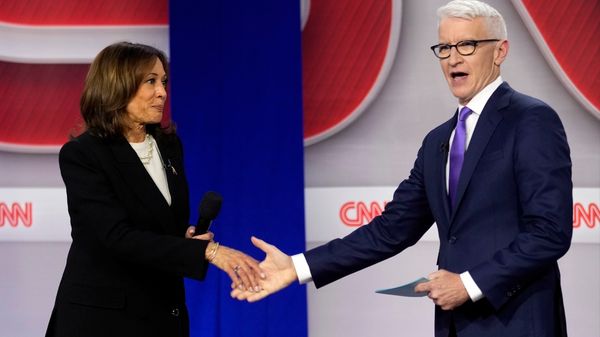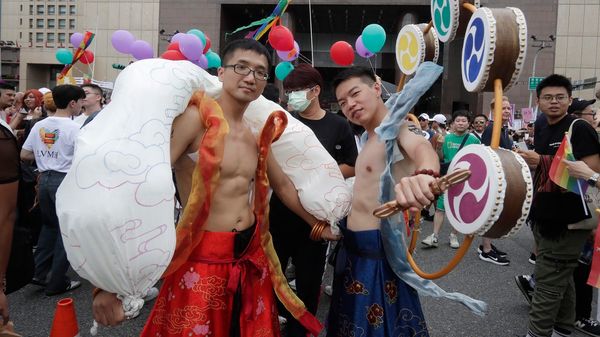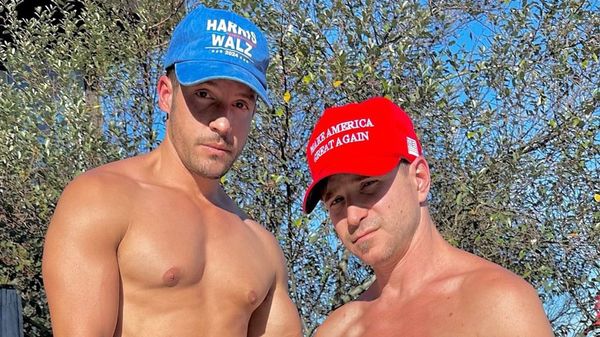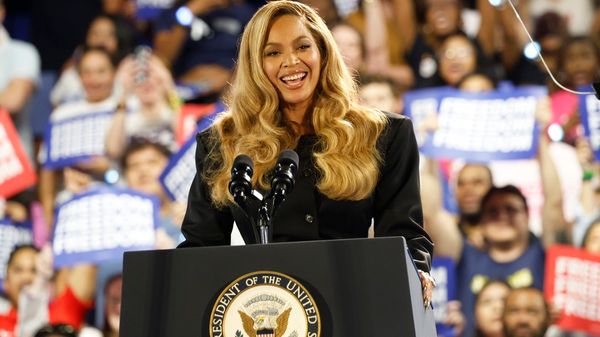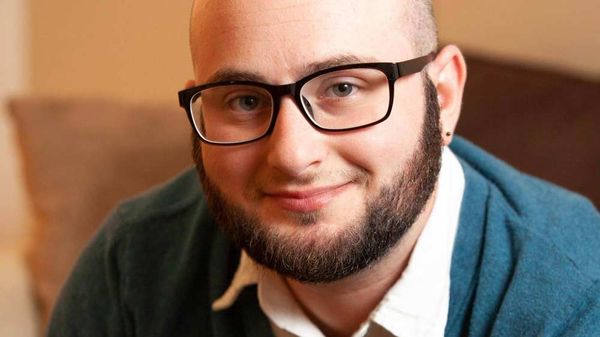October 22, 2007
What's Next for MassEquality?
David Foucher READ TIME: 12 MIN.
The question of MassEquality's future has been framed as whether the organization should honor the original intent of its founding coalition members and disband after successfully defeating any attempts to pass an anti-gay marriage amendment to the state constitution. The question came up numerous times during the Oct. 15 community discussion about MassEquality's future (see "What Now, MassEquality?"). But Josh Friedes, currently the advocacy director for Equal Rights Washington who was one of the founders of MassEquality in 2001, says no agreement was ever made to disband MassEquality when its work on marriage was complete.
"I think ... some people always wanted to see MassEquality go away," Friedes said. "To suggest in any way shape or form that there was an agreement that that would happen, or even to suggest that a majority of people wanted that to happen who were at the table, I think would be a gross misrepresentation of history and past conversation."
Bay Windows spoke with four activists, including Friedes, who were involved in founding MassEquality (see "Who's Who"). All said there is no written agreement about what would become of the coalition when the amendment fights were over and that the group was never able to come to any decision about what should happen with MassEquality when the marriage battle concluded. One source, who would not speak for attribution, stated that the only real future-oriented discussion about MassEquality centered on intimations by some coalition members that when the fight was finished the member organizations would have access to the campaign's assets - mainly goodies like donor files and mailing lists. Friedes, who was then the advocacy director for the Freedom to Marry Coalition, characterized the question of whether MassEquality would dissolve or continue on as a statewide LGBT organization as "one of the elephants in the room."
There were many discussions about what would become of the organization, added Friedes, including a 2002 meeting with a paid facilitator at which coalition partners discussed the question of whether or not MassEquality was meant to continue or movement leaders would stick with the status quo model of independent local and regional LGBT organizations. "The bottom line was we were never able to resolve these issues," said Friedes (see "History Lesson").
MassEquality itself is now grappling with those issues. Two months ago, the MassEquality Board of Directors hired a consultant to guide the board through the question of what MassEquality should do now that marriage equality is safe in Massachusetts - at least for the foreseeable future. It hired management consultant Jack Regan of Metis Consulting Group, who has been talking with MassEquality coalition members, major donors and other stakeholders, to get their input on what should become of the statewide organization.
Disbanding MassEquality at this point would be no easy task. There is a strong desire on the part of the state's four openly gay lawmakers to keep the organization intact. On Oct. 17 state Reps. Carl Sciortino, Liz Malia, Sarah Peake and Cheryl Coakley-Rivera sent an open letter to MassEquality's board asking it to consider the other battles still left to fight in Massachusetts: Passage of non-discrimination and hate crimes laws that provide protections of the basis of gender identity, repeal of the 1913 law prohibiting out-of-state LGBT couples from marrying in Massachusetts and fuller funding of safe schools and LGBT domestic violence initiatives. "We can continue leading the country on GLBT issues, and MassEquality is in an unrivaled position to play a powerful role in that process," the lawmakers wrote (see "Open Letter").
Beyond the politics are the logistics. MassEquality has an 18-member board of directors, which was created when the organization incorporated as a 501(c) 4 organization in 2005. There is the MassEquality Education Fund, a 501 (c)3 with a five-member board that was created in 2004. The organization, which has been led by Campaign Director Marc Solomon since its first director Marty Rouse departed to become HRC's national field director in 2006, spent more than $3 million between October 2006 and September 2007. At the height of its campaign to defeat the amendment earlier this year, MassEquality employed 22 full time staffers, plus 35 part time canvassers. Currently, there are nine employees, all but one of which works full time. MassEquality's army of grassroots supporters numbers around 200,000, according to Solomon. Many of those supporters have organized themselves into regional affiliates of MassEquality; there are 11 such groups across the state. There's money in the bank, Solomon also says, though he declines to state how much (see "By the Numbers").
And then there's the clout that the organization now has, a reputation amassed through two election cycles that saw the organization exercise considerable influence in electing pro-equality candidates and turning back anti-equality pols. Upon being endorsed by the group after his gubernatorial primary victory last year, Gov. Deval Patrick, who knows a few things about grassroots organizing, praised MassEquality as "a highly regarded, very well organized grassroots organization."
Flex those muscles
Bay Windows interviewed 10 local LGBT advocates about what should become of MassEquality, eight of whom were willing to talk on the record. Several themes emerged. Three of the advocates - Sciortino, AIDS Action Committee Executive Director Rebecca Haag and Bev Baccelli of the Marriage Equality Coalition of the South Coast, argued forcefully for expanding MassEquality's mission and lending its considerable clout to other LGBT causes. Rob Henry, who co-chairs the Freedom to Marry Coalition of Massachusetts, Massachusetts Gay and Lesbian Political Caucus board member Barbara Hoffman and Lisa Krinsky, the executive director of the LGBT Aging Project, are intrigued by the idea of MassEquality lending its muscle to other issues, but unclear about how it could actually work. Gary Daffin, who co-chairs the Caucus with Arline Isaacson, who also sits on the MassEquality board, was less enthusiastic about the need for MassEquality to transition to a multi-issue organization. And Carol Rose of the ACLU of Massachusetts said her organization is "agnostic" on the way the LGBT community should organize itself going forward.
"The kind of political clout and community organizing MassEquality brings to the table is something that we as a community shouldn't let go of and shouldn't let just disappear now that the amendment is defeated," said Sciortino.
"MassEquality has very clear name recognition in the legislature and has an influence in the legislature that possibly no other organization has right now," said the openly gay Medford Democrat, who defeated an anti-gay incumbent in 2004 with a big push from MassEquality. "They have an organizing capability and an ability to mobilize constituents in [House] and Senate districts across the state that no other group has. They have lists of people that are committed to these issues and they have expertise on how to motivate people to get involved in issues."
The nature of politics, Sciortino added, is such that legislators give most weight to what they hear in their respective districts when deciding how to cast votes. "And MassEquality," said the lawmaker, "can mobilize that kind of voice." Indeed, in the aftermath of the June 14 defeat of VoteOnMarriage.org's constitutional amendment, many legislators have said they heard from far more opponents of the amendment than they did from its supporters.
Haag said she worries about the negative message that would be sent if MassEquality disbanded. "MassEquality has just vaulted the gay community into a whole new political world and for that to go away, I think that would signal to others that we only cared about one thing," said Haag. It would also call into question the community's "ability to sustain long-term political strength," she added. "I think it would be a terrible signal."
Haag said MassEquality has brought unique qualities to LGBT political organizing. One is a lobbying effort that emphasized constituent contacts instead of backroom wheeling and dealing by paid lobbyists. "I know with HIV and AIDS [lobbying] we've been most effective when we bring in the people impacted by this disease and when you put in front of legislators their constituents. Our lobbyist's role is simply to get us access to that," said Haag.
Additionally, said Haag, MassEquality has provided electoral support for candidates that is unprecedented for a local LGBT organization. Though other gay organizations have historically endorsed candidates, Haag has observed that until MassEquality committed to electing pro-equality incumbents and candidates to the legislature in 2004, "we never brought money with it, we never brought workers with it, we never went out into [legislators's] communities." (Haag is not entirely correct about LGBT organizations not giving money to endorsed candidates. The Gay and Lesbian Labor Activists Network, Bay State Stonewall Democrats and the Freedom to Marry Coalition of Massachusetts all have PAC's that have donated to candidates in recent years. But as Sciortino's election - and those of pols like state Reps. Linda Dorcena Forry of Dorchester and Tom Sannicandro of Ashland made clear, MassEquality had an unmatched ability to mobilize its supporters on behalf of a candidate.)
Haag may be biased in her assessment of MassEquality's potential to lend a hand on other issues of importance to the LGBT community. Her organization benefited from its political skill last year, when it was working to pass the Pharmacy Access Bill in the state Senate with enough votes to override an expected veto by then-governor Mitt Romney. "We called them often when we were working on the [bill]," said Haag of MassEquality. "[With] their knowledge of the different legislators that were up there, both [in the] Senate and House, they gave us great advice on how to approach different people." Additionally, said Haag, "there were people they had contacts with that they introduced us to." Solomon said he offered informal lobbying advice, spoke with then-Senate President Robert Travaglini's office to gauge the positions of key lawmakers on the bill, which allows for the over-the-counter sales of hypodermic needles, and personally contacted some legislators in support of the bill. Solomon emphasized that he did not make the calls in his capacity as MassEquality campaign director "but as someone who cared about this issue and who was lucky enough to have access to some of these folks." The bill eventually passed; Romney's veto was overridden.
Baccelli says that "there absolutely is a place" for a statewide, multi-issue LGBT organization. She points out that the current amendment-free climate is the perfect time at which to prepare for unforeseen crises as well as tackle other issues that need addressing. "It gives you so much more breathing room than it does when you're trying to organize in the face of reacting to something that is happening or is about to happen. ... So I think it would strategically and politically really be a bad move for any organization, from MassEquality on down to not take a really hard look at, what have we got for resources - not just financial, but also time and energy and people - and look around the state and the communities we live in and say, how can we make things better?"
Baccelli knows what she's talking about. In February 2006, her group found itself organizing a candlelight vigil and a groundbreaking community forum on homophobia in the aftermath of the anti-gay attack by Jacob Robida at Puzzles Lounge in New Bedford. "We were a marriage equality group and suddenly we were responding to this horrible thing that happened and it wasn't what we were prepared to do," said Baccelli. That's why South Coast coalition members, at a meeting held earlier this month, decided to reorganize from its original incarnation as a ballot question committee and undertake a broader agenda as an LGBT community group, albeit one that includes working to re-elect area pro-equality legislators in 2008. "We felt if we just disbanded, who would be there to step in if something of interest to the GLBT community down here took place?" said Baccelli. The group has already developed a working relationship with the local public school system, in the interest of creating a more welcoming environment for LGBT students, staff and children with LGBT parents.
There are models for this kind of statewide LGBT organizing: Empire State Pride Agenda in New York and California's Equality California (EQCA) serve as the LGBT community's primary lobbying voice on LGBT legislation in their respective state capitals. Additionally, both organizations do grassroots organizing and electoral work in addition to public education initiatives. Like MassEquality, both organizations are divided into a political arm and an educational foundation arm. In short, both the Pride Agenda and Equality California function in much the same way as MassEquality, with the only difference being that their focus is not limited to marriage equality.
Would MassEquality squeeze out other groups?
Not everyone, however, is enthusiastic about the possibility of MassEquality's transformation into a multi-issue LGBT advocacy group. Daffin, of the Caucus, one of MassEquality's member organizations, said he'd rather not see "an attempt to take over what is already out there and happening. I don't think that's a good idea." Daffin expressed concern that MassEquality's wide base of support - which includes untold numbers of straight allies - was unique to the marriage issue. Smaller, less sexy issues like same-sex domestic violence, elder issues and transgender equality may be best handled by existing organizations that specialize in them. Daffin said he believes directing resources to those organizations would best serve the entire LGBT community. "I think for me the next step for us is going deeper, not broader," Daffin said. "We have a broad, thin layer of support from all around. And I think it is the individual organizations that can reach deeper in to the community so that people who really need support and help and services ... that can take us to a different place."
If Daffin had his way - "just my opinion as citizen Gary," he emphasized - MassEquality would use its infrastructure to raise and grant funds to smaller local LGBT organizations such as the Gay Men's Domestic Violence Project, The LGBT Aging Project and the Massachusetts Transgender Political Coalition. Those organizations, he said, "should be leading the advocacy for themselves." The Caucus, which bills itself "as the most experienced and respected lobbying operation" for LGBT rights at the State House, provides assistance to those organizations, added Daffin, although the organizations do most of the work.
Indeed, the LGBT Aging Project's Krinsky said that the Caucus has assisted with legislative advocacy on the MassHealth equality bill, the Aging Project's chief legislative priority. "We have found them to be a helpful resource," said Krinsky, who noted also that her six-year-old organization has received guidance from mainstream elder service advocates on the bill. The question of whether MassEquality should broaden its mission raises questions for Krinsky, such as, "Where does [the Caucus] fit in to this as far as being an advocacy organization?"
That said, Krinsky also sees value in having an affiliation with "a broader, more established base" like MassEquality.
"We're small and we represent a segment of the community," she said of the six-year-old Aging Project, "but is there a value in having a broader voice, an umbrella that more people fall under? I think that that certainly could exist for folks." Gathering small organizations under one umbrella, she theorized, might provide them with greater resources in terms of access, mobilization, advocacy and money. But like Daffin, Krinsky also worries over whether MassEquality supporters would be enthused about the needs of LGBT seniors. "They developed a mailing list based on marriage and their mailing list might not care about ... the Aging Project, aging issues necessarily. But maybe they would, maybe they wouldn't." Ultimately, said Krinsky of MassEquality, "it would be interesting [to see] how they would reconstitute."
Henry, of the Freedom to Marry Coalition of Massachusetts - another member of the MassEquality coalition - suggested that with the 1913 law on the books, the lack of federal recognition for the state's same-sex married couples and the need to secure legal protections for transgender people and address LGBT aging issues, now is not necessarily the time for his organization or MassEquality to fold up shop. "The struggle for equality is not just limited to the freedom to marry," said Henry, who noted that his organization is also undergoing a process of re-evaluating its next steps while monitoring MassEquality's strategic planning process. Nonetheless, beyond supporting pro-equality legislators for re-election in 2008 and his repeated emphasis in an interview about the need to support other LGBT legislative priorities beyond marriage, Henry offers no commitment on what he'd like to see MassEquality become. "We're a strong supporter of MassEquality ... and we're supportive of that process," said Henry.
Hoffman, the Caucus board member, is also concerned about a premature folding of MassEquality, though more out of concern about further attacks on marriage equality than the need to expand to other LGBT issues. "My sense is we should at least go through the next election cycle - if not more - to make sure we maintain the gains we've achieved," said Hoffman. Beyond that, Hoffman suggested that MassEquality might play "a national role in helping other states do what they have done," should the day come when they're no longer needed in Massachusetts. "The need across the country is endless," said Hoffman.
That said, she's not quite prepared to predict when exactly MassEquality's work might be done in Massachusetts. "Well I think we need to be careful until we solidify what happened," she said referring to the June 14 victory. "Predicting that - my crystal ball, it's too cloudy." There's always the possibility, Hoffman conceded, that the victory could be snatched away. "There's still so much hostility and homophobia that you can't sit back and say, 'Well that was a good job, now I can go play golf.' We've done miracles but I don't think it's time to comfortably rest on our laurels."
The ACLU of Massachusetts, the LGBT community's most active and longest-serving ally, simply said they'll follow the community's lead. "We're frankly agnostic on how MassEquality decides to reorganize itself going forward," said ACLU Executive Director Carol Rose, who said that she has met with Regan as part of MassEquality's planning process. That said, Rose does not question that MassEquality has created "both a really strong brand with a loyal following and some infrastructure." The question now, she added, is how to put those things to work to further the movement for LGBT equality. "I think that it's great that there is a process in place for everyone who cares about equal rights, including the ACLU, to have a say in that."
MassEquality consultant Jack Regan will deliver his findings to the full board Oct. 24. The board is expected to make a decision about MassEquality's future during a meeting Sat., Nov. 3.
David Foucher is the CEO of the EDGE Media Network and Pride Labs LLC, is a member of the National Lesbian & Gay Journalist Association, and is accredited with the Online Society of Film Critics. David lives with his daughter in Dedham MA.
